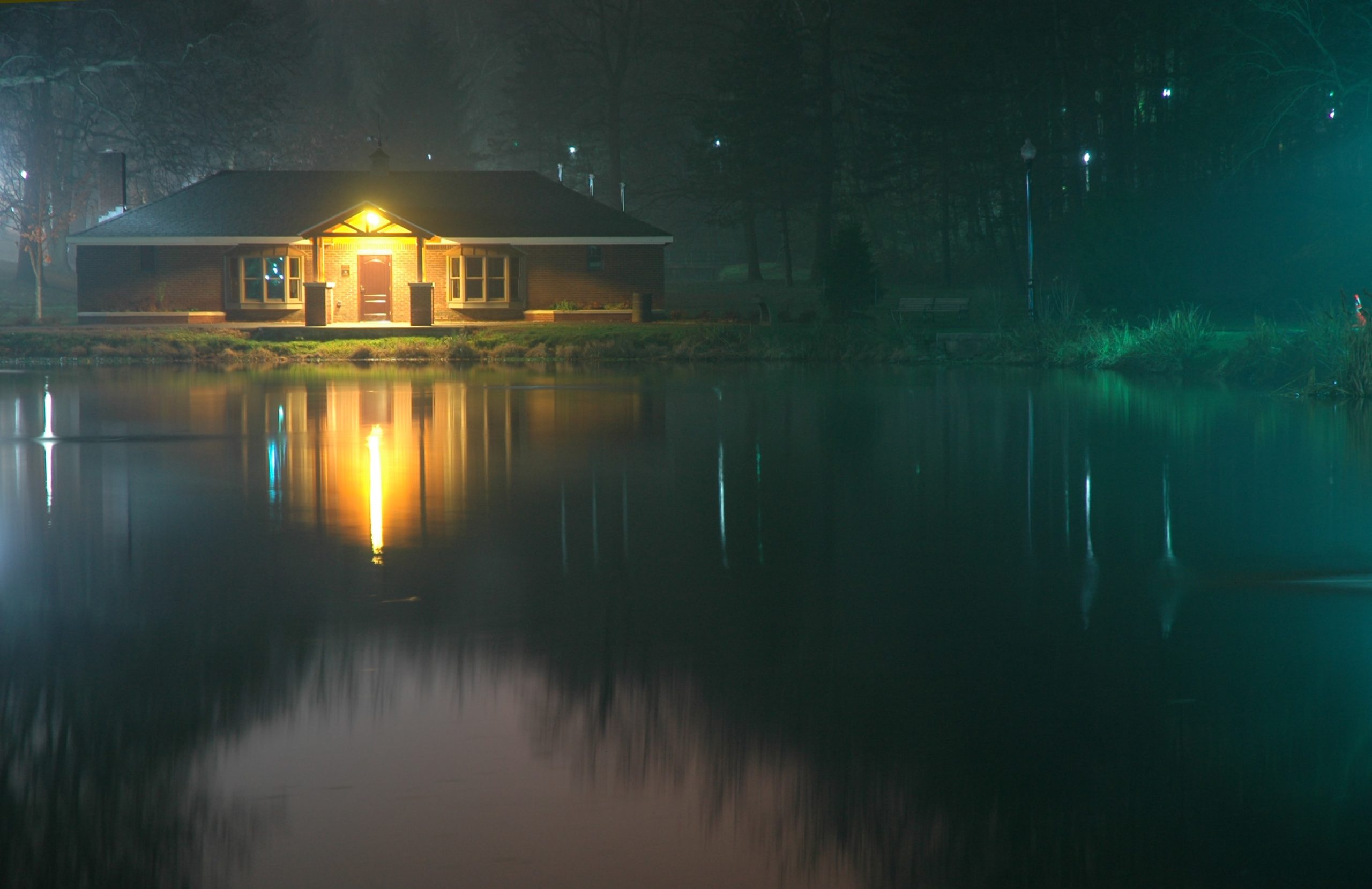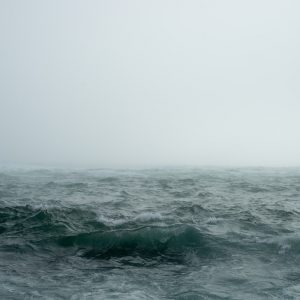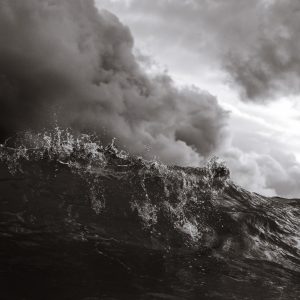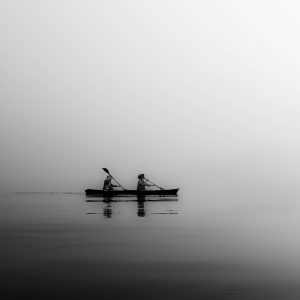There came an evening when, returning home from filling his lungs with rank seaside air, Abel Crane noticed a light in his living room window. The sight froze him. He had never seen a room of his house lit from outside before.
Finally, he removed his spectacles and wiped their lenses on the quarters of his overcoat, hopeful, he supposed, that the window would be dimmed by the time he returned them. But he could still make out the light’s warmth with his all but useless naked eyes, and when he replaced his spectacles he found himself faced with an even greater shock: a figure had appeared in the window. It held itself still off to one side, its features shadowed past the pale curtain.
Abel Crane had to look groundward in order to move, watching his feet as they brought him closer to the only house he had ever known. On the cracked path to the front steps, he took the key from his trousers’ back pocket and paused; he could hear movement beyond the door, footsteps, and a soft-sounding voice. Then the lock slid with a click and the door cracked open.
“Can I help you?” a woman’s voice called from inside.
Abel Crane cleared his throat. “I’m afraid there appears to be some mistake,” he said.
The voice gave no answer.
“Can I ask what you’re doing here?” said Abel Crane.
“Excuse me?”
“It’s just that I don’t believe I know you. If there’s something—”
“What’s this really about?”
This second voice, louder than the first, and apparently male, caused Abel Crane to flinch.
“There appears to be some mistake,” he repeated, but the door was shut on his final word.
Behind the curtain, in the living room’s yellow light, a figure emerged and waved him away. He watched it as his legs backed blindly down the path and across the road, where his heel hit the curb and his tailbone struck the pavement with a bright crack.
The figure stayed still and was joined by another. Abel Crane eyed them both as he rose, wincing, and righted himself.
A car crept by. He followed it first with his eyes and then with his feet, until it abandoned him around the corner. There seemed nowhere to go. Glancing back, he saw his house as it should have been—as it always was—no lights in the windows, no strangers peering down from inside. He blinked and touched his spectacles, a vague hope building only to vanish at the appearance of another light, this one from behind the tiny window of his upstairs bedroom.
A man passed quickly behind the glass, only his shoulders and the back of his head briefly visible. Abel Crane, rapt under the glare of a streetlight half a block down the road, took a few backward steps, then turned and ran.
#
The following morning he returned to find that his key would not fit the lock. He kept trying, over and over, his sense of deflation softened somewhat by fatigue.
All night had been spent on the move, walking briskly through the park and into town, then back along the seawall, and then back through the park and into town again, a circuitous route he’d kept up until the sky lightened and birds made themselves known in the trees. By then it had begun to rain, and he now longed to shed his damp overcoat and scrub himself in a scorching bath. He daydreamed of sleep, of collapsing into bed and losing himself till dark.
But his door would not open.
He turned, defeated, and saw a fat raccoon in the front yard. It regarded him placidly as it pissed in the grass, breaking its gaze only once it had finished. Abel Crane let it lead him, following behind as it waddled to one side of the house, the striped tail disappearing into some bushes around back.
The place appeared empty. He continued around his property, searching the windows for light or any sign of life. The back door he never used was locked also. Pressing his face to the square glass pane, he looked for a moment at the dimness indoors before moving on.
Back out front, he crouched rather than sat atop the steps, worried that his tailbone might be fractured. He would wait just like this, he decided. Something would happen if only he waited on the steps outside his home.
But nothing happened. Or had it? When his thoughts returned, Abel Crane found himself wondering whether much of the morning had passed. His knees burned, and his eyes, still sore, kept blinking at the yard and at the street beyond the path. The white sky told him nothing.
As he began to stand, his eye caught a woman’s watching face from a window across the street. He did not know her name, and yet one of his hands reached out in a gesture unclear even to himself. The woman frowned, crossed her arms, and withdrew from the window. She would help him, he assured himself as he straightened, stretched, and descended the front steps. She was his neighbor and would want to understand.
The story he would tell took mental form as Abel Crane strode into the street. Then he lurched forward, screaming. A car came upon him from nowhere, grazed his hip with a swerve, and was gone. It happened before he saw it happen. Only afterward, crumpled in the road with his eyes clenched, could his brain visualize what had nearly killed him. Or had he been killed? He kept his eyes shut and waited, wondering. But he did not hurt. He felt nothing but a hot pulse in the centre of his skull, an after-pressure that was not quite pain on his hip.
When he opened his eyes the pavement swam, his thin hands blurred as though immersed in water. He swept them across the ground until he felt his spectacles, one lens missing, the other splintered in a spider’s web.
“Are you all right?”
The woman from the window stood in the doorway of her home. Abel Crane had forgotten her, along with all he needed to say. He coughed into his wrist as he rose.
“Do you know who I am?” he said, addressing the sidewalk in a broken voice.
“I only heard a scream,” said the woman.
Abel Crane pushed wisps of hair from his face and shut one eye so he could see.
“I only heard a scream,” the woman repeated, “and I saw you in the road. What happened?”
“Nothing happened.”
He turned away, embarrassed. Behind him his house had changed. A car was parked out front, and the living room curtains had been pulled open. He tried to think whether the car had been there earlier and tried also to remember if it looked like the car that—
“Do you need some help?”
He spun around to the woman, having forgotten her again. The black silhouette of a mountain range was sewn across her sky-blue sweater, which he gave a protracted stare.
“Sir?”
“You must know who I am!” he shouted to the mountains.
His neighbor shrank like a scolded child. “I only heard a scream,” she said and slipped behind the door as she pushed it closed.
#
With the few coins he found hidden throughout his overcoat and trousers, Abel Crane ordered a cup of soup at a cafe near the park. People came and went while he sat alone outside at a table for two, eating very slowly because he never wanted to finish. Only once the chairs had been stacked upside-down on the tables around him did he stand and leave, dazed, his eyes kept half shut.
A fetid sea-stink returned him to his senses. He stood at the base of a rotting wharf facing a sunset like a stagnant explosion. Through his one cracked lens, the sea beneath the sky looked like rippling pieces of fiery glass, and the longer he focused on each piece with a palm pressed to his bad eye, the more inviting he found the picture they formed. But when he placed a foot on the soft wood of the stinking wharf, he quickly withdrew it, terrified, and hurried away.
Later he woke with a wet chill in the bones of his chest. His bed felt hard beneath him. Reaching for a phantom blanket, his hand touched instead a cold moisture that filmed his coat. He lay very still. His bed was packed earth, his partial cover the dripping branches of some giant oak.
An hour, perhaps longer, slid by as the rain continued. Black shapes he took for deer stalked the outer dark. At last one approached and sank to the ground not far from where he lay, shivering against the tree’s wide trunk. Abel Crane felt oddly soothed as he listened to the rough sound of its restful breathing. He closed his eyes for another few wet minutes, then stood painfully and left.
The rain thinned as he groped his way out of the park. The empty streets gleamed. Only his legs knew where they took him, and so it came as some surprise when he found his feet frozen to a pool of sodium light half a block from his home.
He could see it, the darkness behind the windows, the whole house dead from the inside out. When after a minute no lights appeared, Abel Crane moved through the freshly rinsed air, past the car still parked out front, and up the stone steps to the door.
The key failed him again. He let it drop to the ground as a scratching noise at his back turned his head. Eyes like twin points of green light watched him from the patch of grass beside the path, eyes that vanished as soon as he moved toward them. This time he chased the lumbering form, falling to his knees at the bushes and plunging a hand after the black-and-white tail.
His fingers closed on something cold and coarse. Retracting his arm, he held up to his one good eye a stone the size of a fist. Another kind of key, he decided, pushing himself to his feet.
The square of glass in the back door looked to be painted black. Without hesitation, Abel Crane raised the stone to head-height and punched a sharp hole in the pane, the bright sound tensing his limbs. He waited, holding still his breath and his body until he felt merged with the silence in his ears. Then his hand slid carefully through the hole and found the lock.
As soon as he stood indoors, he felt a child’s inverted fear. He could see almost nothing, and yet he wondered what might find him if he allowed his finger to illuminate the room. What might he find? He placed the stone on a counter and gently crunched through shards of the window on his blind way to the front hall.
But the room he entered was wrong. Even in the pitch dark, he could sense the wide openness before him. Cautiously, he felt his way through it to another doorway, this one leading to the hall he’d thought was behind him. To his right stood the front door, while the staircase ahead stretched to what looked like nowhere.
He put his hands out to find the stairs, crawling their length like a young boy in the dark. On the top landing he looked for a long moment down a lightless hall harboring doors he could barely see. Behind the first was a toilet, which he used while quietly seated and from which he stood without flushing.
The second room he entered contained bodies in a bed. A curtain covered the window, and he had to inch closer to see the white limbs spilling from black sheets, the heads placed sideways atop invisible pillows. Abel Crane dropped his coat to the floor and, scratching at the tip of his raw scalp, looked absently around for some makeshift murder weapon. But all he could make out were the arms and heads of the strangers beneath him. He leaned forward.
“I don’t know you,” he said, whispering through his teeth. “You’re asleep in my bed and I don’t know who you are.”
The body nearest him rotated. An arm was flung halfway to the floor. Abel Crane wanted it gone but could not touch it. So he touched the sheet, pinching it between his fingers and pulling it down. The arm moved quickly to the head, which screamed.
Abel Crane screamed also. He turned to the door and tripped to his kneecaps on his coat. A light came on, and two pale, topless bodies fled the bed and clung to the far wall. A man’s voice shouted a woman’s name.
“I never asked you here!” Abel Crane cried out as he struggled to stand. “You’re in my house and I want you gone!”
He could not look at the faces of those he had found in the bed. He waited to be struck, screamed at, or killed, but by the time he’d risen from the floor, he found himself alone. The room had been evacuated as though the walls were ablaze, and as Abel Crane gently lowered himself to the edge of the bed, he could hear two pairs of feet collapsing down the staircase, the front door being opened and slammed.
It was only then, in the renewed quiet, that he noticed the wall in front of him looked unfamiliar. Pinned to it in places were photographs of people whose names he did not know. He did not know the names of anybody. As he glanced tiredly around, it registered only vaguely that his room was in other ways different than he remembered, although no clear image came to mind when he tried to recall what exactly he had expected. He felt far too tired to recall anything.
With a gigantic yawn, he fell back and spread himself out across the bed, the joints of his sore limbs crackling as he stretched. His hand found the sheet he had pulled aside, and he drew it now over his still-clothed, sour-smelling body. How nice it was to be exhausted when your own bed was beneath you and there was nothing to be done but sleep.
And with this as the sole thought in his head, a rare smile broke upon Abel Crane’s face as he rolled over to extinguish the only light inside the house.




